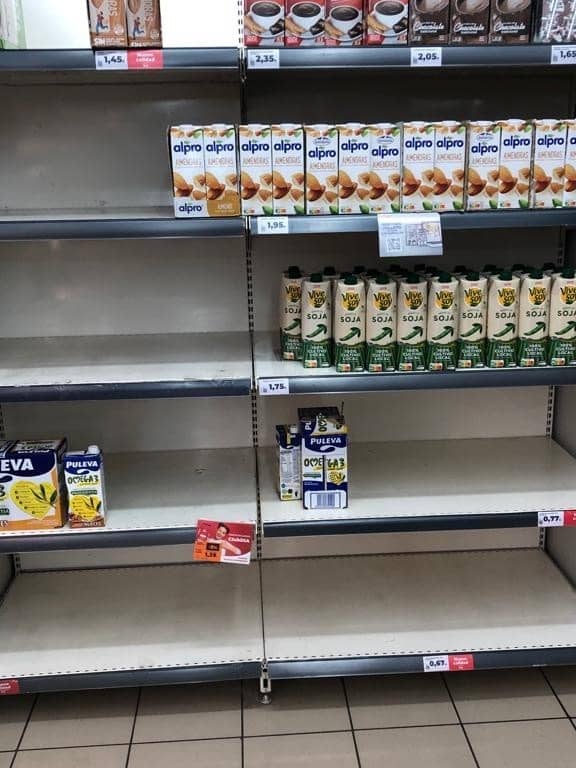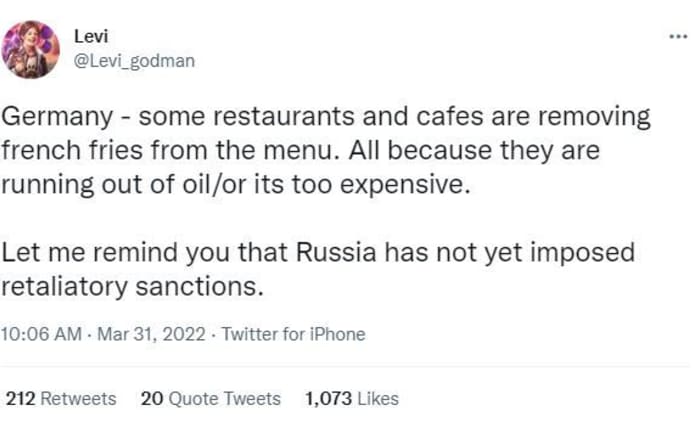This post was originally published on this site
As if some of the highest electricity prices in Europe and threats of gas rationing are not enough, Germany is apparently now facing a shortage of french fries.
Reports that some German restaurants have stopped serving french fries with burgers and other dishes due to a lack of vegetable and other cooking oil have been filtering out of the country. The shortages, of course, stem from a war raging in Ukraine, not too far away from Europe’s biggest economy.
One problem is a lack of sunflower oil, of which Ukraine is the world’s biggest producer, that has not just been running low in Germany. Spain has been limiting customer purchases of the oil since shortly after the war broke out in the East European country more than a month ago.
Potentially worsening the situation, Russia, meanwhile, reportedly plans to ban sunflower seeds and rapeseeds exports, and impose export quotes on sunflower oil in a bid to stem surging prices in the country that is under heavy global sanctions pressure over its invasion of Ukraine.
The German shortages were reported by public radio and television broadcaster, NDR, earlier this week.
The report said restaurant and snack bar owners in some parts of the country had been removing french fries from the menu, because there isn’t enough cooking oil. Panic buying and stockpiling were also blamed. Rapeseed oil, which is produced in the country, is one possible substitute, Momme Matthiesen, chief executive officer of the Association of the Oilseed Processing Industry told the German broadcaster.
Holger Zschaepitz, Berlin-based senior financial reporter at German news provider Welt, confirmed the lack of french fries in the country, saying most restaurants are no longer offering that side dish.

Empty milk shelves at a Madrid ‘Dia’ grocery store on March 22, 2022. A two-week strike over high petrol prices has left lingering shortages in Spain.
MarketWatch/Kollmeyer
“[There are no] other shortages yet, apart from wiring harnesses for cars. However, there may soon be a mustard shortage due to a lack of mustard seed. And the inflation figure of 7.3% really shocked,” said Zschaepitz, in responses to questions from MarketWatch.
While the Federal Reserve’s favorite U.S. inflation calculator on Thursday knocked out another 40-year high, with an annual rise of 6.4%, Germany this week reported the highest consumer prices since reunification of the country in 1990. Spain, meanwhile, had Germany beat with a March annual figure of 9.8%, the biggest surge since 1985.
Germany also announced this week that it was enacting the first phase of an emergency plan to control shortages of natural gas, as the country is heavily reliant on Russian supplies, something the EU is trying to rectify. Germany has endured soaring energy and electricity prices, like many of its European neighbors. Those prices were climbing even before war broke out in Ukraine.
The Spanish government, meanwhile, has made it possible for supermarkets to ration some products owing to some empty shelves following a two-week trucker’s strike more than a week ago. A reported three million liters of milk was dumped by producers, leading to a backlog of trying to refill shelves.
The strike, of course, was linked to high gas prices, which is of course linked to the deadly war in Ukraine that has dragged on for more than five weeks.
On social media, some pondered just how much worse shortages might get.

Uncredited


